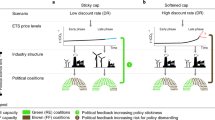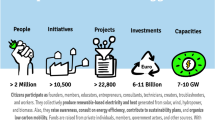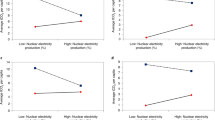Abstract
The United States has often led the world in supporting renewable energy technologies at both the state and federal level. However, since 2011 several states have weakened their renewable energy policies. Public opinion will probably be crucial for determining whether states expand or contract their renewable energy policies in the future. Here we show that a majority of the public in most states supports renewable portfolio standards, which require a portion of the electricity mix to come from renewables. However, policy design and framing can strongly influence public support. Using a survey experiment, we show that effects of renewable portfolio standards bills on residential electricity costs, jobs and pollution, as well as bipartisan elite support, are all important drivers of public support. In many states, these bills’ design and framing can push public opinion above or below majority support.
This is a preview of subscription content, access via your institution
Access options
Access Nature and 54 other Nature Portfolio journals
Get Nature+, our best-value online-access subscription
$29.99 / 30 days
cancel any time
Subscribe to this journal
Receive 12 digital issues and online access to articles
$119.00 per year
only $9.92 per issue
Buy this article
- Purchase on Springer Link
- Instant access to full article PDF
Prices may be subject to local taxes which are calculated during checkout



Similar content being viewed by others
References
Hoffert, M. I. et al. Advanced technology paths to global climate stability: energy for a greenhouse planet. Science 298, 981–987 (2002).
Trancik, J. E., Chang, M. T., Karapataki, C. & Stokes, L. C. Effectiveness of a segmental approach to climate policy. Environ. Sci. Technol. 48, 27–35 (2014).
CO2 Emissions (Metric Tons Per Capita) (World Bank, 2017); http://data.worldbank.org/indicator/EN.ATM.CO2E.PC?year_high_desc=true
Ross, M. L. et al. Global progress and backsliding on gasoline taxes and subsidies. Nat. Energy 2, 16201 (2017).
Sovacool, B. K. Rejecting renewables: the socio-technical impediments to renewable electricity in the United States. Energy Policy 37, 4500–4513 (2009).
Howe, P. D., Mildenberger, M., Marlon, J. R. & Leiserowitz, A. Geographic variation in US climate change opinion at state and local scales. Nat. Clim. Change 5, 596–603 (2015).
Ansolabehere, S. & Konisky, D. M. Clean and Cheap: How Americans Think About Energy in the Age of Global Warming (MIT Press, 2014).
Righter, R. Wind Energy in America: A History (University of Oklahoma Press, 1996).
Rabe, B. G. Statehouse and Greenhouse: The Emerging Politics of American Climate Change Policy (Brookings Institution Press, 2004).
Stokes, L. C. Power Politics: Renewable Energy Policy Change in US States PhD thesis, Massachusetts Inst. Technology (2015).
Lyon, T. P. Drivers and impacts of renewable portfolio standards. Annu. Rev. Resour. Econ. 8, 141–155 (2016).
Giberson, M. Trump’s policy may undermine pro-growth intentions. Nat. Energy 1, 16156 (2016).
Erikson, R. S., Wright, G. C. & McIver, J. P. Statehouse Democracy: Public Opinion and Policy in the American States (Cambridge Univ. Press, 1993).
Bernauer, T. Climate change politics. Annu. Rev. Polit. Sci. 16, 421–448 (2013).
Jacobsson, S. & Lauber, V. The politics and policy of energy system transformation—explaining the German diffusion of renewable energy technology. Energy Policy 34, 256–276 (2006).
Bolsen, T. & Cook, F. L. The polls–trends: public opinion on energy policy: 1974–2006. Public Opin. Q. 72, 364–388 (2008).
Smith, E. R. Energy, The Environment, and Public Opinion (Rowman & Littlefield Publishers, 2002).
Farhar, B. Trends: public opinion about energy. Public Opin. Q. 58, 603–632 (1994).
Wei, M., Patadia, S. & Kammen, D. M. Putting renewables and energy efficiency to work: how many jobs can the clean energy industry generate in the US? Energy Policy 38, 919–931 (2010).
Guber, D. L. A cooling climate for change? Party polarization and the politics of global warming. Am. Behav. Sci. 57, 93–115 (2012).
Dunlap, R. E., McCright, A. M. & Yarosh, J. H. The political divide on climate change: Partisan polarization widens in the US. Environ. Sci. Policy Sustain. Dev. 58, 4–23 (2016).
Lenz, G. S. Follow the Leader?: How Voters Respond to Politicians’ Policies and Performance (University of Chicago Press, 2012).
Bullock, J. G. Elite influence on public opinion in an informed electorate. Am. Polit. Sci. Rev. 105, 81–118 (2011).
Schaffner, B. & Ansolabehere, S. Cooperative Congressional Election Study, 2014 (2015); http://dx.doi.org/10.7910/DVN/XFXJVY
Widespread Public Support for Renewable Energy Mandates Despite Proposed Rollbacks (National Surveys on Energy and Environment, 2015); http://closup.umich.edu/files/ieep-nsee-2015-renewable-portfolio-standards.pdf
Hainmueller, J., Hopkins, D. J. & Yamamoto, T. Causal inference in conjoint analysis: understanding multidimensional choices via stated preference experiments. Polit. Anal. 22, 1–30 (2013).
Barbose, G. Putting the Potential Rate Impacts of Distributed Solar into Context (Lawrence Berkeley National Laboratory, 2017).
Stokes, L. C. Electoral backlash against climate policy: a natural experiment on retrospective voting and local resistance to public policy. Am. J. Polit. Sci. 60, 958–974 (2015).
Roe, B., Teisl, M. F., Levy, A. & Russell, M. US consumers’ willingness to pay for green electricity. Energy policy 29, 917–925 (2001).
Stokes, L. C. The politics of renewable energy policies: the case of feed-in tariffs in Ontario, Canada. Energy Policy 56, 490–500 (2013).
Aklin, M. & Urpelainen, J. Debating clean energy: frames, counter frames, and audiences. Glob. Environ. Change 23, 1225–1232 (2013).
Coley, J. S. & Hess, D. J. Green energy laws and Republican legislators in the United States. Energy Policy 48, 576–583 (2012).
Warshaw, C. & Stokes, L. Replication Data for: Renewable Energy Policy Design and Framing Influence Public Support in the United States (2017); http://dx.doi.org/10.7910/DVN/DL4JY8
Acknowledgements
Funding for this research was provided by the MIT Energy Initiative. Thank you to D. Konisky and A. Berinsky, participants at UCSB PEPP, Columbia University LSS and APPAM 2014 for feedback on this research. We also appreciate logistical support from the MIT Political Experiments Research Lab (PERL).
Author information
Authors and Affiliations
Contributions
The authors contributed equally on all aspects of this article. C.W. was the principle investigator on the grant from the MIT Energy Initiative that funded this research, and managed the survey experiment with Survey Sampling International (SSI).
Corresponding author
Ethics declarations
Competing interests
The authors declare no competing financial interests.
Supplementary information
Supplementary Information
Supplementary Notes 1–2, Supplementary Tables 1–7 and Supplementary References. (PDF 234 kb)
Rights and permissions
About this article
Cite this article
Stokes, L., Warshaw, C. Renewable energy policy design and framing influence public support in the United States. Nat Energy 2, 17107 (2017). https://doi.org/10.1038/nenergy.2017.107
Received:
Accepted:
Published:
DOI: https://doi.org/10.1038/nenergy.2017.107
This article is cited by
-
Examining the effects of gasoline prices on public support for climate policies
Nature Energy (2024)
-
Cost sensitivity, partisan cues, and support for the Green New Deal
Journal of Environmental Studies and Sciences (2024)
-
Fluctuations in the wind energy supply do not impair acceptance of wind farms
Sustainable Energy Research (2023)
-
How climate policy commitments influence energy systems and the economies of US states
Nature Communications (2023)
-
Partisanship and energy efficiency program participation in the USA
npj Climate Action (2023)



